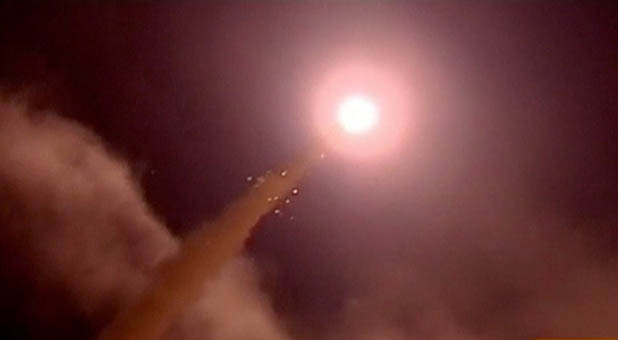While Iran routinely threatens Israel and its Lebanese terror proxy, Hezbollah, has a vast arsenal of rockets pointed at the Jewish state, experts say the Islamic Republic was sending messages elsewhere through its first missile strike on another country in three decades.
Iran struck Islamic State targets in Syria on June 18, in retaliation for Islamic State’s twin terror attacks against prominent Iranian institutions June 7. Iran had not launched a missile strike on another nation since the Iran-Iraq War in the 1980s.
Situated nearly 1,800 kilometers (1,118 miles) away from Israel, Iran reportedly has missiles capable of reaching the Jewish state. The precision-guided Zolfaghar missiles Iran fired Sunday into the Syrian city of Deir ez-Zor have a range of about 750 kilometers (466 miles). Iran proceeded to showcase Zolfaghar missiles Friday during anti-Israel “Al-Quds Day” rallies.
The Israeli government has ongoing concerns about Iran’s nuclear program, ballistic missile program and state sponsorship of terrorism, but the Iranian missile strike in Syria seemingly had little to do with the Jewish state.
Dr. Raz Zimmt, an Iran expert at two Israeli think tanks, the Institute for National Security Studies (INSS) and the Forum for Regional Thinking, told JNS.org Iran’s missile attack was “a direct response to the [June 7] terror attack in Tehran and a message both for domestic, regional and international use.”
Zimmt explained that, internationally, Iran “wanted to send a message that it considers its missile capabilities to be vital to its national interests, especially in light of the growing U.S. criticism against this capability.” The U.S. Senate passed new sanctions against Iran’s ballistic missile program June 15.
“The Iranian regime wanted to send a message to its rivals, especially the Saudis, and to a lesser extent, in my view, Israel, showing its strength as a regional power,” Zimmt said.
Missile Accuracy ‘the Lesser Issue’
IDF Chief of Staff Lt. Gen. Gadi Eizenkot said the Iranian missile launch was “smaller” than what was reported and achieved “far from precise hits.”
Yet accuracy “is the lesser issue,” said Dr. Eado Hecht, a military expert at Bar-Ilan University’s Begin-Sadat Center for Strategic Studies.
“If [the Iranians] launch towards targets in an Israeli city, then it really does not matter on which street the missile falls—their capability of hitting a target area the size of Haifa or Tel Aviv is a given,” Hecht told JNS.org.
Hecht said the strike in Syria demonstrated Iran’s ability to reach a target area as far as 700 kilometers (435 miles) away. That does not prove Iran can strike Israel with its missiles, but the regime is assumed to have such a capability, according to Hecht, who added that it is difficult for the Jewish state to gather information on Iranian missiles solely from test-launches.
Overall, Iran’s “message is more to others rather than to Israel” through the strike on Syria, said Hecht.
“I think demonstrating this capability and the willingness to use it was directed more to the Saudis than to Israel,” he said.
Iran Showcases Its Strength
INSS analyst Zimmt said he sees the recent escalation between the Shi’a power of Iran and the Sunni power of Saudi Arabia as contributing to Iran’s efforts to showcase its strength.
“Iran considers current developments in the region as an expression of a combined effort by the Saudi-American-Zionist alliance to curb its influence in the region, while it continues its own efforts to expand its influence,” he said.
Iran’s Islamic Revolutionary Guard Corps (IRGC) military force has come under criticism domestically following the Islamic State terror attacks in Tehran, “so it had to react,” said Zimmt.
“The bottom line,” he said, “is that Iran always tries to turn a challenge or weakness, such as the terror attack, into an opportunity to show its strength.” {eoa}
This article was originally published at JNS.org. Used with permission.
See an error in this article?
To contact us or to submit an article






















